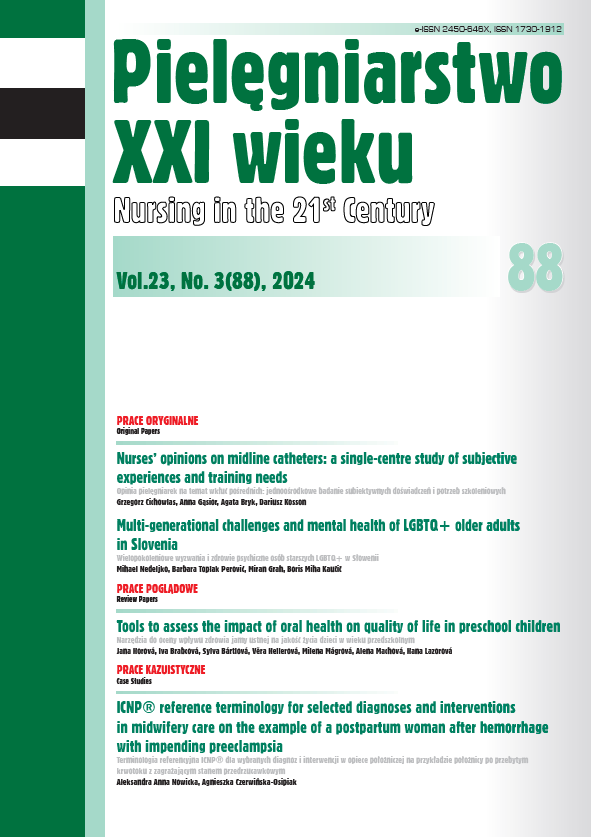Association of the COVID-19 pandemic on the risk of mental disorders among healthcare personel
DOI:
https://doi.org/10.2478/pielxxiw-2024-0027Keywords:
pandemic, COVID-19, mental disorders, medical staffAbstract
ASSOCIATION OF THE COVID-19 PANDEMIC ON THE RISK OF MENTAL DISORDERS AMONG HEALTHCARE PERSONEL
Introduction. The SARS-CoV-2 pandemic has left a physical and psychological mark on human beingsall around the world. Regardless of age, gender or social status, the burden of the pandemic and its eff ects are felt by the entire population. Depending on the SARS-CoV-2 variant and risk factors the symptoms of SARS-CoV-2 infection can vary, both in frequency and severity. In clinical practice, the severity of the disease is determined by using a four-grade scale, to which the patient’s treatment, care and rehabilitation are individually tailored . A separate issue of the aftermath of SARS-CoV-2 is the psychological eff ects on those at risk, patients and medical personnel. The widespread of the pandemic, the imposed restrictions and the continuing scale of the disease have negatively aff ected mental health, which cannot be underestimated. An important task is to implement prevention and recovery programs to counteract the long-term eff ects of the pandemic.
Aim. The aim of this study is to assess risk of depression, anxiety, stress and post-traumatic stress disorder (PTSD) symptoms among medical personnel associated with the SARS-COV-2 pandemic and pandemic threat.
Material and methods. The study included 133 medical professionals. A diagnostic survey was adopted as the method for the study using a self-administered questionnaire, the Depression, Anxiety and Stress Scale (DASS-21) and the Impact of Events Scale (IES-R). The data was collected online, using the Google Form application.
Results. The highest mean value in the evaluation of negative psychological states experienced while working under pandemic conditions was obtained in the stress category (M=7.8; SD±3.29), although only 8% of the respondents experienced it to a severe or extremely severe degree. When analyzing the severity of the study variables to a severe or extremely severe degree, anxiety was the most severe (15%). When it came to depression, 43% of medical professionals declared a moderate condition. 23% of respondents declared the presence of most of the symptoms characteristic of PTSD. The highest average value was obtained in the area of hyperarousal. The risk of developing symptoms of traumatic stress/posttraumatic stress disorder is not dependent on sociodemographic variables.
Conclusions. Within the examined areas concerning the occurrence of depressive, anxiety and stress disorders, stress was the most severe disorder. Personnel working periodically in direct contact with a COVID-19-infected patient were at the highest risk of developing PTSD in the future.
References
1. Dzieciątkowski T, Filipiak KJ (red.). Koronawirus SARS-CoV-2 - zagadnienie dla współczesnego świata. Aktualizacja 2021. Warszawa: PZWL; 2021.
2. Piękoś-Lorenc I, Woźniak-Holecka J, Jaruga-Sękowska S. Otyłość, nadwaga i problemy psychiczne jako konsekwencje pandemii koronawirusa. [w:] Zdrowie i style życia: ekonomiczne, społeczne i zdrowotne skutki pandemii. Nowak W, Szalonki K (red.) E- Wrocław: Wydawnictwo. Prawnicza i Ekonomiczna Biblioteka Cyfrowa. Wydział Prawa, Administracji i Ekonomii Uniwersytetu Wrocławskiego; 2021, s. 69-78.
3. Zawilska JB, Swaczyna T, Masiarek P, et al. COVID-19: Epidemiologia, patogeneza, diagnostyka i objawy kliniczne. Farmacja Polska. 2021; 77: 166-177.
4. Flisiak R, Horban A, Jaroszewicz J, et al. Zalecenia dotyczące postępowania w zakażeniach SARS-CoV-2 Polskiego Towarzystwa Epidemiologów i Lekarzy Chorób Zakaźnych z 23 lutego 2022 roku. Medycyna Praktyczna. 2022; 3: 49-77.
5. Doremalen N, Bushmaker T, Morris DH, et al. Aerosol and Surface Stability of SARS-CoV-2 as Compared with SARS-CoV-1. The New England Journal of Medicine. 2020; 382: 1564-1567.
6. Szarpak Ł, Dzieciątkowski T, Filipiak KJ. Bezpieczeństwo personelu medycznego w dobie COVID-19 według zasad EBM. Warszawa: PZWL; 2021.
7. Cipora E, Mielnik A. Wybrane aspekty medyczne i społeczne pandemii Covid-19. Journal of Education, Health and Sport. 2022; 12: 11-20.
8. Bulut C, Kato Y. Epidemiology of COVID-19. Turkish Journal of Medical Sciences. 2020; 50: 563-570.
9. Serwis Rzeczypospolitej Polskiej: Zdrowie psychiczne. Jaka jest nasza kondycja po pandemii Covid-19 i jak można ją poprawić? [online]. Dostępne: https://www.gov.pl/web/psse-zyrardow/zdrowie-psychiczne. Data pobrania: 23.03.2023.
10. Koszałka J. Psychologiczne konsekwencje pandemii COVID-19. [w:] Zdrowie i style życia: ekonomiczne, społeczne i zdrowotne skutki pandemii. Nowak W, Szalonki K (red.) Wrocław: E-Wydawnictwo. Prawnicza i Ekonomiczna Biblioteka Cyfrowa. Wydział Prawa, Administracji i Ekonomii Uniwersytetu Wrocławskiego; 2021, s. 47-57.
11. Dymecka J. Psychospołeczne skutki pandemii COVID-19. Neuropsychiatria i Neuropsychologia. 2021; 16: 1-10.
12. Heitzman J. Wpływ pandemii COVID-19 na zdrowie psychiczne. Psychiatria Polska. 2020; 54: 187-198.
13. Makara-Studińska M, Załuski M, Adamczyk K, et al. Polish version of the Depression Anxiety Stress Scale (DASS-42) – adaptation and normalization. Psychiatria Polska. 2024; 58: 63-78.
14. Juczyński Z, Ogińska-Bulik N. Pomiar zaburzeń po stresie traumatycznym - polska wersja Zrewidowanej Skali Wpływu Zdarzeń. Psychiatria. 2009; 6: 15-25.
15. Wayessa ZJ, Melesse GT, Hadona EA. Anxiety and Stress due to COVID-19 Pandemic and Associated Factors Among Healthcare Workers in West Guji Zone Southern Ethiopia. J. Racial. Ethn. Health Disparities. 2023; 10(3): 1499-1507.
16. Sokół-Szawłowska M, Mierzejewski P, Heitzman J. Subiektywne pogorszenie stanu psychicznego pracowników służby zdrowia podczas pierwszej fali pandemii COVID-19 w Polsce. Psychiatria Polska. 2022; 56: 1269-1287.
17. Tan BYQ, Chew NWS, Lee GKH, et al. Psychological Impact of the COVID-19 Pandemic on Health Care Workers in Singapore. Annals of Internal Medicine. 2020; 173: 317-320.
18. Lai J, Ma S, Wang Y, et al. Factors Associated With Mental Health Outcomes Among Health Care Workers Exposed to Coronavirus Disease 2019. JAMA Network Open. 2020; 3: 1-12.
19. Senczyszyn A, Lion KM, Szcześniak D, et al. Mental Health Impact of SARS-COV-2 Pandemic on Long-Term Care Facility Personnel in Poland. Journal of the American Medical Directors Association. 2020; 21: 1576-1577.
Downloads
Published
Issue
Section
License
Copyright (c) 2024 Authors

This work is licensed under a Creative Commons Attribution 4.0 International License.




